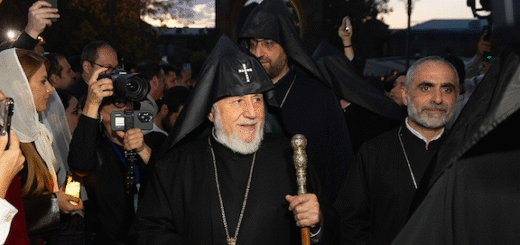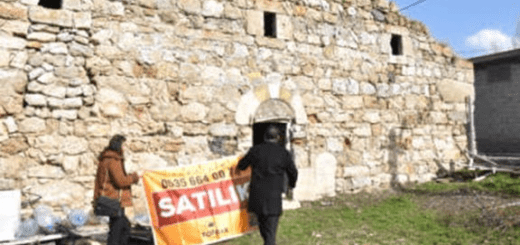The Vatican Needs to Defend Armenians

By Stephan Pechdimaldji
RealClearWorld
In April 2015, during a Mass commemorating the 100th anniversary of the mass killings of Armenians during World War I, Pope Francis used the term “genocide” to describe the massacres, a move that drew a sharp rebuke from Turkey. He further solidified his position during a 2016 visit to Armenia where he called the event a “tragedy” and a genocide that should not be forgotten.
As the first nation to adopt Christianity in 301AD, Armenia has historic ties that have long united them with the Holy See through the core Christian values of justice, truth and solidarity. Pope Francis’ recognition of the Armenian genocide was a watershed moment that further underscored that unshakable bond between The Vatican and Armenians worldwide.
However, over the last year, that connection has been severely undermined by a series of controversial agreements between The Vatican and Azerbaijan that threaten the moral reputation of The Holy See on the global stage. Amid ongoing human rights abuses, the Vatican has inexplicably deepened ties with Azerbaijan, a government accused of ethnically cleansing more than 120,000 Armenian Christians from their ancestral homeland of Artsakh as it seeks to curry favor with Baku and solicit financial resources from the petro-autocratic state to help fund various Vatican projects.
This month, the Vatican signed new collaborative agreements with Azerbaijan that include substantial funding to restore holy sites in Rome and Europe, including the refurbishment of Vatican-owned catacombs, masterpieces of the Vatican Museums and numerous books and manuscripts in the Vatican’s Library, and most notably the restoration of a bas-relief adorning St. Peter’s Basilica depicting Pope Leo I’s meeting with Attila the Hun.
This follows a controversial conference the Vatican hosted in April titled “Christianity in Azerbaijan: History and Modernity,” which was widely criticized by over 350 scholars and professionals worldwide as well as Armenian activists and Armenian church leaders. While the event purported to be a scholarly look at Azerbaijan’s history of coexistence and multiculturalism, it was Azerbaijan’s latest attempt at historical revisionism by suggesting that Armenian churches and other religious sites in Artsakh belong to ancient Caucasian Albanians. Azerbaijan’s true aim was clear – to erase and delegitimize the indigenous roots of Armenians in the region and portray them as foreign to their own ancestral lands.
For the Vatican to allow Azerbaijan a platform to continue its campaign of distorting history while perpetuating this false state-sponsored narrative, is both a moral and spiritual failure in leadership. It is also an abrogation of their responsibility to stop Christian persecution as the conference took place while Azerbaijan concurrently destroys and defaces hundreds of Armenian churches, monasteries, khachkars (cross-stone monuments), and other religious sites that have stood in the region for thousands of years.
This type of “caviar diplomacy” which Azerbaijan has used so effectively to whitewash their dreadful human rights record and influence foreign countries and politicians should not come as a surprise. Whether it was hosting the 2024 United Nations Climate Change Conference (COP29) or the Formula One Grand Prix, Azerbaijan has deftly leveraged its natural resources for various geopolitical trade-offs to grab a seat at the world’s table.
But the Vatican is different. We should hold the Vatican to a higher standard, especially if we are to believe that its diplomacy aligns with its moral mission. In other words, the optics of cozying up to a corrupt country like Azerbaijan for money is a bad look for the Vatican. That is why the Vatican’s newfound relationship with Azerbaijan is extremely troubling and needs to be reconsidered if they want to reclaim its moral authority.
So, what can the Vatican do to safeguard its reputation as a moral leader on the world stage as Azerbaijan promises to stain it?
To begin with, they can cease any further partnerships and agreements with Azerbaijan, particularly those used for propaganda purposes that promote historical revisionism which risks further violence against a vulnerable Christian minority.
They must advocate forcefully for the protection of all remaining Armenian religious, cultural and heritage sites in Artsakh and allow the safe return of Armenians to Artsakh.
And they must demand the immediate release of all Armenian political prisoners and the unconditional release of all Armenian POWs.
Finally, they must stop turning a blind eye to Azerbaijan’s religious persecution of Armenian Christians and hold them accountable.
The Vatican can’t preach coexistence and tolerance and then ink deals with a government that has no respect for human rights or the rule of law. In many ways, the Vatican isn’t just any government. It is a spiritual hub with holy responsibilities that carry significant weight. It is time that they live up to those ideals and reassess its relationship with Azerbaijan.
Stephan Pechdimaldji is a communications strategist living in the San Francisco Bay Area. He is a first-generation Armenian American and the grandson of survivors of the Armenian genocide. You can follow him on X at @spechdimaldji.





